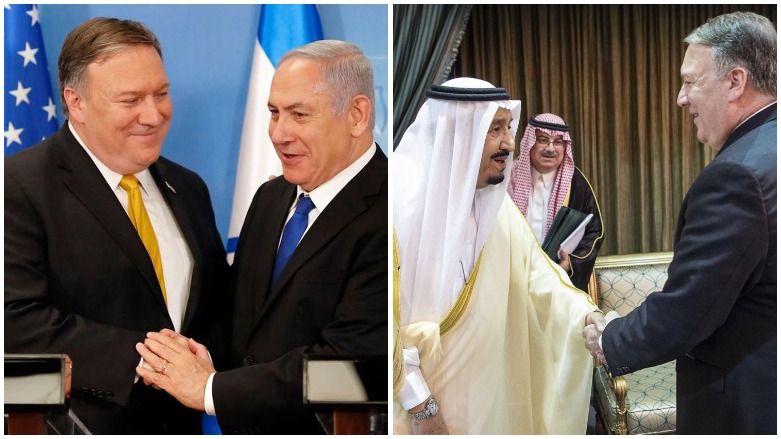Pompeo visits Saudi Arabia, Israel, promises tough stand against Iran

WASHINGTON DC (Kurdistan 24) – On Saturday evening, the new US Secretary of State, Mike Pompeo, arrived in Saudi Arabia following a NATO meeting in Brussels, and on Sunday, he flew on to Israel.
Tehran was high on Pompeo’s agenda in the two countries, both of which view a belligerent, aggressive Iran as their top national security threat.
Tensions with Iran were evident in both countries. On Saturday, shortly before he arrived in Riyadh, Iranian-backed rebels in Yemen fired a volley of missiles into the southern Saudi province of Jizan.
Riyadh claimed to have downed all missiles before impact, but one Saudi man died from “falling fragments of military projectiles,” the Saudi military said.
On Sunday, following Pompeo’s meeting with Israeli Prime Minister Benjamin Netanyahu, Israel launched air strikes at military bases in two Syrian provinces, presumably targeting the Iranian presence there.
Pompeo’s tough stand toward Tehran was evident throughout his trip.
“Iran destabilizes the entire region,” Pompeo affirmed at a joint press conference with the Saudi Foreign Minister.
“It supports proxy militias and terrorist groups,” as well as “the murderous Assad regime.”
Calling Iran “the greatest sponsor of terrorism in the world,” Pompeo said, “unlike the prior administration, we will not neglect the vast scope of Iran’s terrorism.”
“We are determined to make sure it never possesses a nuclear weapon,” he affirmed. “The Iran deal in its current form does not provide that assurance.”
President Donald Trump must decide by May 12, if he wants to continue with the Iran deal in its current form or reimpose sanctions.
While in Riyadh, Pompeo also urged the Saudis to support a UN-mediated settlement to the conflict in Yemen.
“The political and security vacuum” that the conflict creates has been exploited by al-Qaida in the Arabian Peninsula and the Islamic State (IS), he warned, and “when these groups are given safe haven, the US homeland is at risk.”
Pompeo also urged the Saudis to repair their rift with Qatar, the existence of which, he complained, creates openings for Iran in the region.
Trump has called on the Saudis to contribute substantially more, including troops, to the anti-IS effort of the US-led coalition in Syria.
The Saudis told journalists that they were, indeed, ready to send troops, but were waiting for word from the US. Asked about this, Pompeo replied, “We need to make sure we get it right.”
“This is literally a situation so complex you want to measure twice and cut once,” he said, leaving the impression that the US military was in little hurry to bring Saudi troops into Syria.
Pompeo’s talks in Israel, where he held a two-hour meeting with Prime Minister Benjamin Netanyahu, seemed to focus more narrowly on Iran.
Israel shares the Trump administration’s concerns about the inadequacies of the Iranian nuclear deal, and it views Iran’s presence in Syria as a threat to its own security.
Shortly after Pompeo left for Jordan, another US ally concerned about Iran’s aggression in the region, Israel attacked Syria, presumably targeting the Iranian presence there.
